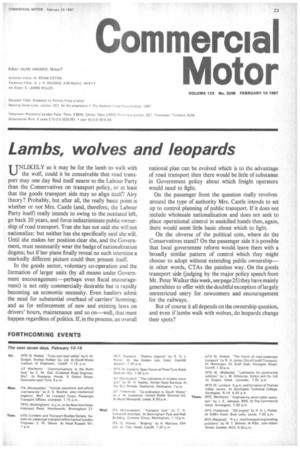Lambs, wolves and leopards
Page 25

If you've noticed an error in this article please click here to report it so we can fix it.
UNLIKELY as it may be for the lamb to walk with the wolf, could it be conceivable that road transport may one day find itself nearer to the Labour Party than the Conservatives on transport policy, or at least that the goods transport side may so align itself? Airy theory? Probably, but after all, the really basic point is whether or not Mrs. Castle (and, therefore, the Labour Party itself) really intends to swing to the outdated left, go back 20 years, and force indiscriminate public ownership of road transport. True she has not said she will not nationalize; but neither has she specifically said she will. Until she makes her position clear she, and the Government, must necessarily wear the badge of nationalization dogma; but if her plans finally reveal no such intention a markedly different picture could then present itself.
In the goods sector, voluntary co-operation and the formation of larger units (by all means under Government encouragement—perhaps even fiscal encouragement) is not only commercially desirable but is rapidly becoming an economic necessity. Even hauliers admit the need for substantial overhaul of carriers' licensing; and as for enforcement of new and existing laws on drivers' hours, maintenance and so on—well, that must happen regardless of politics. If, in the process, an overall national plan can be evolved which is to the advantage of road transport then there would be little of substance in Government policy about which freight operators would need to fight.
On the passenger front the question really revolves around the type of authority Mrs. Castle intends to set up to control planning of public transport. If it does not include wholesale nationalization and does not seek to place operational control in unskilled hands then, again, there would seem little basic about which to fight.
On the obverse of the political coin, where do the Conservatives stand? On the passenger side it is possible that local government reform would leave them with a broadly similar pattern of control which they might choose to adopt without extending public ownership— in other words, CTAs the painless way. On the goods transport side (judging by the major policy speech from Mr. Peter Walker this week, see page 25) they have mainly generalities to offer with the doubtful exception of largely unrestricted entry for newcomers and encouragement for the railways.
But of course it all depends on the ownership question, and even if lambs walk with wolves, do leopards change their spots?












































































































